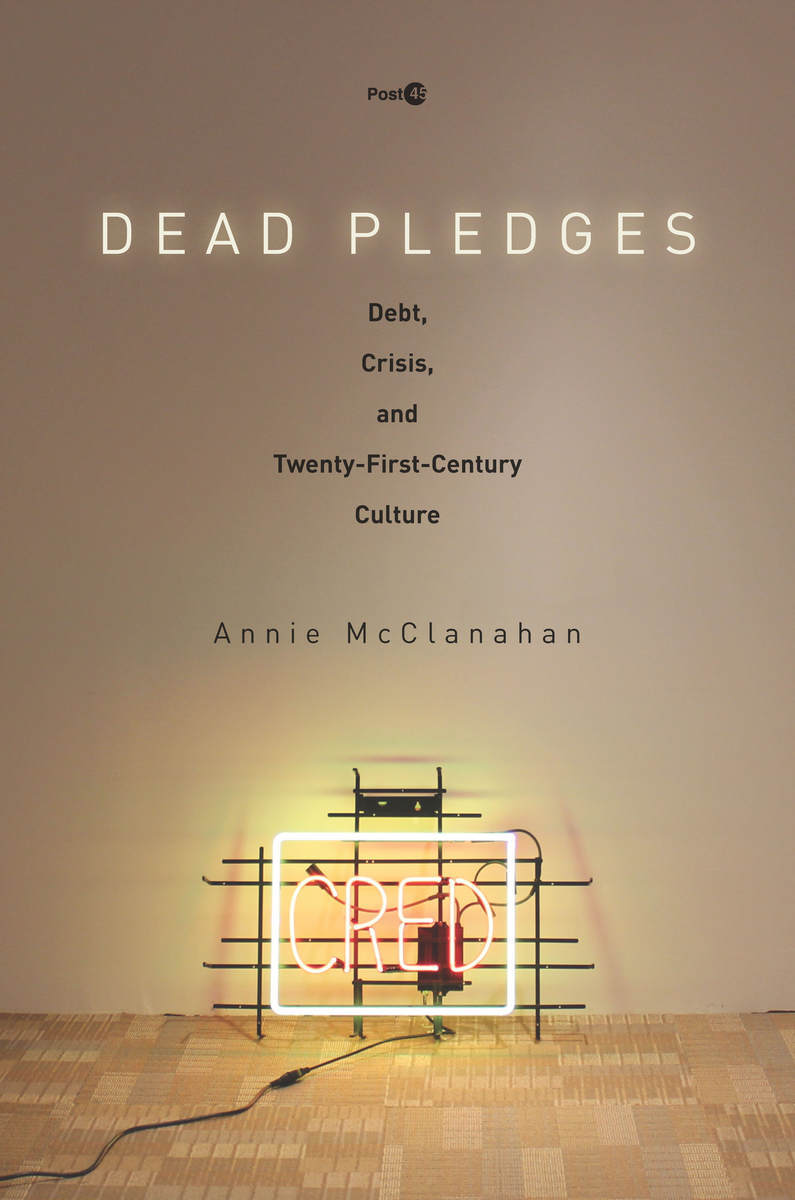Annie McClanahan: Dead Pledges: Debt, Crisis, and Twenty-First-Century Culture (2016)
Filed under book | Tags: · affect, art criticism, capitalism, debt, economics, finance, financial crisis, horror, literary criticism, mediation, mortgage, photography, property

“Dead Pledges is the first book to explore the ways that U.S. culture—from novels and poems to photojournalism and horror movies—has responded to the collapse of the financialized consumer credit economy in 2008. Connecting debt theory to questions of cultural form, this book argues that artists, filmmakers, and writers have re-imagined what it means to owe and to own in a period when debt is what makes our economic lives possible. Encompassing both popular entertainment and avant-garde art, the post-crisis productions examined here help to map the landscape of contemporary debt: from foreclosure to credit scoring, student debt to securitized risk, microeconomic theory to anti-eviction activism. A searing critique of the ideology of debt, Dead Pledges dismantles the discourse of moral obligation so often invoked to make us repay. Debt is no longer a source of economic credibility, it contends, but a system of dispossession that threatens the basic fabric of social life.”
Publisher Stanford University Press, 2016
Post ’45 series
ISBN 9780804799058, 0804799059
ix+235 pages
Reviews: Brian Whitener (The New Inquiry, 2017), Sofia Cutler (LA Review of Books, 2017), Julian Murphet (Affirmations, 2017), Davis Smith-Brecheisen (Mediations, 2017), Arne De Boever (boundary2, 2017), Laura Finch (Journal of Cultural Economy, 2018).
Comment (0)Alexander R. Galloway, Eugene Thacker, McKenzie Wark: Excommunication: Three Inquiries in Media and Mediation (2013)
Filed under book | Tags: · communication, horror, media, media theory, mediation, mysticism, mythology, networks, queer theory, theory

“Always connect—that is the imperative of today’s media. But what about those moments when media cease to function properly, when messages go beyond the sender and receiver to become excluded from the world of communication itself—those messages that state: “There will be no more messages”? In this book, Alexander R. Galloway, Eugene Thacker, and McKenzie Wark argue that these moments reveal the ways the impossibility of communication is integral to communication itself—instances they call excommunication.
In three linked essays, Excommunication pursues this elusive topic by looking at mediation in the face of banishment, exclusion, and heresy, and by contemplating the possibilities of communication with the great beyond. First, Galloway proposes an original theory of mediation based on classical literature and philosophy, using Hermes, Iris, and the Furies to map out three of the most prevalent modes of mediation today—mediation as exchange, as illumination, and as network. Then, Thacker goes beyond Galloway’s classification scheme by examining the concept of excommunication through the secret link between the modern horror genre and medieval mysticism. Charting a trajectory of examples from H. P. Lovecraft to Meister Eckhart, Thacker explores those instances when one communicates or connects with the inaccessible, dubbing such modes of mediation “haunted” or “weird” to underscore their inaccessibility. Finally, Wark evokes the poetics of the infuriated swarm as a queer politics of heresy that deviates from both media theory and the traditional left. He posits a critical theory that celebrates heresy and that is distinct from those that now venerate Saint Paul.
Reexamining commonplace definitions of media, mediation, and communication, Excommunication offers a glimpse into the realm of the nonhuman to find a theory of mediation adequate to our present condition.”
Publisher University of Chicago Press, 2013
TRIOS series
ISBN 0226925226, 9780226925226
210 pages
Reviews: Daniel Colucciello Barber (Parrhesia, 2014), Jay Murphy (Afterimage, 2014), Geert Lovink (e-flux, 2014, Wark’s response), Aleksandra Kaminska (Reviews in Cultural Theory, 2015), Marco Deseriis (Culture Machine, 2015).
PDF (updated on 2019-11-20)
Comment (0)International Journal of Communication, 8: Special Section: Media, Hot and Cold (2014)
Filed under journal | Tags: · climate, media, media studies, mediation, meteorology, temperature, weather
“The 21st century will be the century of temperature. As global temperatures rise, polar ice melts, and drought becomes a permanent way of life, temperature has become the single greatest challenge to human life on the planet.
Temperature is also a media problem in many ways: from the heat generated by new media—whether in our hands or in giant server farms; to the technologies used to measure, represent, and understand temperature; to the contribution of new media systems themselves to the problem of global warming. But this is not a new phenomenon. For centuries, media and mediation have been at the center of experiments in and beliefs about temperature and its relation to culture, gender, language, and life. In this special section, we take the 50th anniversary of Marshall McLuhan’s Understanding Media literally to ask “What are hot and cold media?””
Contributors: Alice Christensen, Wolfgang Ernst, Brenton J. Malin, Jessica Mudry, Dylan Mulvin, Lisa Parks, Rafico Ruiz, Nicole Starosielski, Jonathan Sterne, Marita Sturken.
Special section of the IJoC 8
Edited by Dylan Mulvin and Jonathan Sterne
Creative Commons BY-NC-ND License
ISSN 1932-8036
44 pages
PDF (single file)
PDFs (separate articles)

